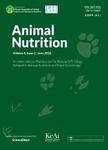Zinc lactate alleviates oxidative stress by modulating crosstalk between constitutive androstane receptor signaling pathway and gut microbiota profile in weaned piglets
作者机构:College of Animal Science and Technology Hunan Agricultural University Sichuan Academy of Animal Sciences Animal Breeding and Genetics Key Laboratory of Sichuan Province Livestock and Poultry Biological Products Key Laboratory of Sichuan Province Sichuan Animtech Feed Co. Ltd Hunan Provincial Key Laboratory of Animal Nutritional Physiology and Metabolic Process CAS Key Laboratory of Agro-Ecological Processes in Subtropical Region National Engineering Laboratory for Pollution Control and Waste Utilization in Livestock and Poultry Production Institute of Subtropical Agriculture Chinese Academy of Sciences College of Advanced Agricultural Science University of Chinese Academy of Sciences Hunan Provincial Key Laboratory of Animal Intestinal Function and Regulation Laboratory of Animal Nutrition and Human Health College of Life Sciences Hunan Normal University
出 版 物:《Animal Nutrition》 (动物营养(英文))
年 卷 期:2024年第16卷第1期
页 面:23-33页
核心收录:
学科分类:090502[农学-动物营养与饲料科学] 0905[农学-畜牧学] 0906[农学-兽医学] 09[农学]
基 金:supported by the National Natural Science Foundation of China (32172755, 32130099) Hunan Key Research and Development Plan (2022NK2023) Shandong Province Taishan Industry Leading Talents Project Blue Talents Project
主 题:Zinc lactate Intestinal barrier Oxidative stress Inflammation Constitutive androstane receptor Gut microbiota
摘 要:This study aimed to determine the regulatory mechanism of dietary zinc lactate (ZL) supplementation on intestinal oxidative stress damage in a paraquat (PQ)-induced piglet model. Twenty-eight piglets (mean body weight 9.51±0.23 kg) weaned at 28 d of age were randomly divided into control, ZL, PQ, and ZL+PQ groups (n=7 in each group). The ZL-supplemented diet had little effect on growth performance under normal physiological conditions. However, under PQ challenge, ZL supplementation significantly improved average daily gain (P0.05) and reduced the frequency of diarrhea. ZL improved intestinal morphology and ultrastructure by significantly increasing the expression level of the jejunal tight junction protein, zonula occludens-1(ZO-1) (P0.05), and intestinal zinc transport and absorption in PQ-induced piglets, which reduced intestinal permeability. ZL supplementation also enhanced the expression of antioxidant and antiinflammatory factor-related genes and decreased inflammatory cytokine expression and secretion in PQinduced piglets. Furthermore, ZL treatment significantly inhibited the activation of constitutive androstane receptor (CAR) signaling (P0.01) in PQ-induced piglets and altered the structure of the gut microbiota, especially by significantly increasing the abundance of beneficial gut microbes, including UCG_002, Ruminococcus, Rikenellaceae_RC9_gut_group, Christensenellaceae_R_7_group, Treponema, unclassified_Christensenellaceae, and unclassified_Erysipelotrichaceae (P 0.05). These data reveal that pre-administration of ZL to piglets can suppress intestinal oxidative stress by improving antioxidant and anti-inflammatory capacity and regulating the crosstalk between CAR signaling and gut microbiota.



